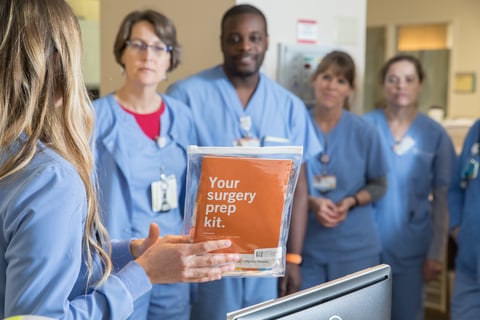Preventing surgical site infections is a crucial quality metric in healthcare. But one California health system says they are aiming to tackle the issue with a surprisingly simple solution: getting patients involved.
Dignity Health officials said they've begun providing kits to patients prior to surgery to give them a better idea of how to prepare for a procedure in a way that best prevents potential infection. Launched in late 2016, the program offers patients a shower card that can hang over a shower head, an appropriate soap and a timer.
Though hard data on the impact the kits are having on infection rates is still rolling in, officials said early signs suggest that the initiative has led to reductions in infection rates.
Page West, the health system's chief nursing officer, said the presurgical kits are an example of how engaging patients in their care, and in evidence-based quality improvement, can be a "slam dunk."
"This is a great way to really try to reduce surgical site infections while engaging patients around Dignity Health's brand," West said.
RELATED: Dignity Health has a strategy to prevent nurse burnout: Promote a culture of resilience
As hospitals look at ways to improve quality, infection control is a key point of concern. Hospital-acquired infections, and surgical site infections in particular, can be costly to treat.
The World Health Organization and the Centers for Disease Control and Prevention have both recently released guidelines for reducing surgical infections. WHO recommends that clinicians only prescribe antibiotics before and during surgery, but not after, to curb the growth of resistance, while the CDC's guidelines touch on elements covered by Dignity's kits, including suggesting patients take a bath or shower the night before surgery.
RELATED: Disruptive doctors make more mistakes in the operating room
In addition, recent research has directly linked patient experience and engagement with safety. A Press Ganey report found that hospitals with high engagement scores also had lower spending and provided safer care.

Dignity Health created the kits in collaboration medical supplier Medline Industries Inc., West said, and is currently working to expand the program to all of its facilities. West said that the response from patients thus far has been positive. In early surveys, about 97% of patients who tried the kit gave them a positive review, West said.
RELATED: 6 patient safety improvement opportunities
Dignity Health did face some challenges in launching the program, West said. Each hospital within the system has its own logistics and standard operating procedures that initiatives like the presurgical kits must be built into.
Plus, launching a new program like this requires buy-in and collaboration from a number of different stakeholders, West said. She said that Dignity created an executive steering community to oversee the project and ensured that multiple disciplines from across the hospital were included.
Even so, she said a project like this could easily be replicated in other hospitals that are looking to get patients more involved in presurgery planning or in other points along the care continuum.